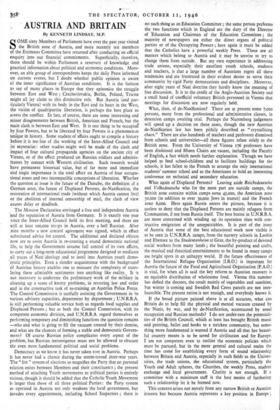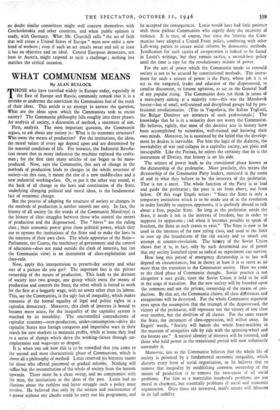k AUSTRIA AND BRITAIN
By KENNETH LINDSAY, M.P.
SOME sixty Members of Parliament have over the past year visited the British zone of Austria, and more recently ten members of the Estimates Committee have returned after conducting an official enquiry into our financial commitments. Superficially, therefore, there should be within Parliament a reservoir of knowledge and practical information about political and economic conditions. More- over, an able group of correspondents keeps the daily Press informed on current events, but I doubt whether public opinion is aware Of the inner significance of Austrian conditions. It is the fashion to say of many places in Europe that they epitomise the struggle between East and West ; Czechoslovakia, Berlin, Poland, Trieste might all lay claim to this distinctive role. But Austria (and par- ticularly Vienna) with its body in the East and its heart in the West, the victim of quadripartite liberation, is perhaps the best place to assess the conflict. rn fact, of course, there are some interesting and minor disagreements between British, American and French, but the main clash is between East and West. It is one thing to be occupiee by lour Powers, but to be liberated by four Powers is a phenomenon unique in history. Some student of affairs ought to compile a history before it is too late of the working of the Inter-Allied Council and its secretariat : other studies might well be made of the clash and impact of four cultural .propaganda agencies on the ancient city of Vienna, or of the effect produced on Russian soldiers and adminis- tiators by contact with Western civilisation. Such research would iiave permanent historical value, but of far more and immediate -dhd tragic importance is the total effect on Austria of four occupa- tional zones and two incompatible conceptions of liberation. Whether the question at issue is the future of the Danube, the definition of a German asset, the future of Displaced Persons, de-Nazification, the restoration of international trade (without which Austria cannot live) or the abolition of internal censorship of mail, the clash of view causes delay or deadlock.
The Moscow Declaration envisaged a free and independent Austria and the separation of Austria from Germany. It is exactly one year ,since the Inter-Allied Council held its first meeting, and there are still at least too,000 troops in Austria, over a half Russian. After nine months a new control agreement was signed, which in effect substituted advice for control. The additional and declared objects - now are to assist Austria in re-creating a sound democratic national life, to help the Government assume full control of its own affairs, to carry out a long-term educational programme designed to eradicate all traces of Nazi ideology and to instil into Austrian youth demo- `cratic principles. Even a slender acquaintance with the background of Austrian history enables one to measure the complexity of trans- lating these admirable sentiments into anything like reality.. It is not necessary to underrate the preliminary work of the military in cleaning up a score of knotty problems, in restoring law and order and in the constructive task of re-training an Austrian Police Force. The Control Commission is tactfully assisting the Government in ;ts various advisory capacities, department by department ; U.N.R.R.A. is still performing valuable service both as regards food supplies and Displaced Persons ; but as both the Control Commission, with its competent economic division, and U.N.R.R.A. regard themselves as performing temporary and diminishing functions the question remains —who and what is going to fill the vacuum created by their demise, and what are the chances of forming a stable and democratic Govern- ment? Of course Russian policy complicates every aspect of the problem, but Russian intransigence must not be allowed to obscure the even more fundamental political and social problems.
Democracy as we know it has never taken root in Austria. Perhaps it has never had a chance during the storm-tossed inter-war years. The " list " system of elections so magnifies the Party that no personal relation exists between Members and their constituen:s ; the present method of attaching Youth movements to political parties is entirely vicious, thoukh it should be added that the Catholic Youth Movement is larger than those of all three political Parties : the Party system as operated in Austria not only weakens the local government, but invades every appointment, including School Inspectors ; there is no such thing as an Education Committee ; the same person performs the two functions which in England are the duty Of the Director of 'Education and Chairman of the Education Committee ; the majority of newspapers arc either the direct organs of political parties or of the Occupying Powers ; here again it must be added that the Catholics have a powerful weekly Press. These are all matters which belong to Austria and it may be unwise to try to change them from outside. But my own experience in addressing trade unions, especially their excellent youth schools, students and teachers, is that a large number of Austrians regret all these tendencies and are frustrated in their evident desire to serve their community by rigid Party demarcations and disciplines. Moreover, after eight years of Nazi doctrine they hardly know the meaning of free discussion. It is to the credit of the Anglo-Austrian Society and a small band of unofficial voluntary British personnel in Vienna that meetings for discussion are now regularly held.
What, then, of de-Nazification? There are at present some 7,000 persons, many from the professional and administrative classes, in detention camps awaiting trial. Perhaps the Nuremberg judgement will speed up a decision on these cases, though the new Austrian de-Nazification law has been pithily described as "crystallising chaos." There are also hundreds of teachers and professors dismissed from schools and universities—all these figures relate solely to the British zone. From the University of Vienna 176 professors have been dismissed and fifteen Chairs are vacant, including the Faculty of English, a fact which needs further explanation. Though we have helped to feed school-children and to facilitate buildings for the schools, it has fallen to the French to arrange the only international students' summer khool and to the Americans to hold an interesting conference on technical and secondary education.
What again of Displaced Persons? Leaving aside Reichsdeutsche and Volksdeutsche who for the most part are outside camps, the British zone contains within camps some 45,000, the American zone 5o,00o (in addition to over 30,000 Jews in transit) and the French zone 6,000. Here -again Russia enters the picture, because it is useless to deny that the Displaced Persons are mainly refugees from Communism, if not from Russia itself. The best brains in U.N.R.R.A. are more concerned with winding up its operation than with con- tructive emigration of the unrspatriables. It is part of the irony of Austria that some of the best educational work now visible is to be seen in U.N.K.R.A. camps; from the nursery schools in Leobin and Ebensee to the Studentenheim at Graz, the by-product of devoted social workers from many lands ; the beautiful painting and crafts, the musical and theatrical entertainments to be found in many camps are bright spots in an unhappy world. If the future effectiveness of the International Refugee Organisation (I.R.O.) is important for Austria the future of the Food and Agricultural Organisation (F.A.O.) is vital, for when all is said the key reform to Austrian recovery is an equitable distribution of wholesome food. Vienna this summer has defied the doctors, the result mainly of vegetables and sunshine, but winter is coming and Swedish Red Cross parcels are not inex- haustible. The present ration is not enough, and everybody knows it.
If the broad picture painted above is at all accurate, what can Britain do to- help fill the physical and mental vacuum created by the Nazis, by war, and by de-Nazification, accentuated by zonal occupation and Russian Methods? I do not under-rate the potentiali-
ties of the British Council; which at least has brought British music and painting, ballet and books to a stricken community, but some- thing more fundamental is wanted if Austria and all that her beauti- ful country means is to be saved for civilisation and for Europe. I am not competent even to outline the economic policies which
must be pursued, but- in the more general and cultural realm the time has come for establishing every form of sound relationship between Britain and Austria, especially in such fields-as the Univer-
sities, the trade unions, the educational system, particularly the Youth and Adult spheres, the Churches, the weekly Press, student exchange and local government. Charity is not enough. If a committee with a minimum staff is the best means of furthering such a relationship let it be formed now.
This concern arises not merely from any narrow British or Austrian interest but because Austria represents a key position in Europe ; no doubt similar committees might well concern themselves with Czechoslovakia and other countries, and when public opinion is ready, with Germany. What Mr. Churchill calls "the act of faith that will create a United States of Europe" must now enlist a new band of workers ; even if such an act entails sweat and toil at least it has an objective and an ideal. Central European democrats, not least in Austria, might respond to such a challenge ; nothing less matches the critical occasion.































 Previous page
Previous page